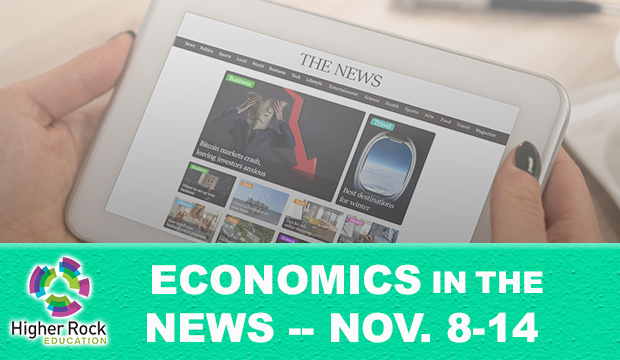Economics in the News – Nov. 8-14, 2021
Economics impacts our lives every day. Below are some of the top storylines from this past week related to economics.
- Higher prices are likely here to stay well into 2022. The government said last week that the consumer price index (CPI) is up 6.2 percent from one year ago. That marks the largest 12-month increase since 1990.
Inflation is likely to remain high as long as businesses struggle to keep up with demand for goods and services. The Federal Reserve has indicated that it would raise its interest rates from record low levels by the end of 2022 which is much earlier than they had predicted a few months ago.[Associated Press]
- Electric automaker Rivian made its debut on the NASDAQ last week, raising more money than any other U.S. initial public offering (IPO) since 2014. It closed its first day on the publicly traded market at $100.73, up from the original offering price of $78.
Its closing market value of roughly $86 billion, making it more highly valued on Wall Street than Ford ($77.4 billion) and on par with General Motors ($86.04 billion). The optimism surrounding Rivian is the latest sign of excitement among investors for the future of electric vehicles (EV). [The Wall Street Journal]
- From clogged ports to crowded railyards, America’s supply chain system is struggling to keep up. Retailers are warning of higher prices, empty shelves and lost jobs this holiday season.
CBS’ 60 Minutes reported on the shortcomings and issues in the supply chain system. It found in Los Angeles – where 40 percent of the nation’s imports go through – that ports are packed to the brim, creating a backlog at sea with ships idling waiting to be unloaded. With limited space, truckers are having difficulties in dropping off empty containers to pick up new ones. Railyards have piles of containers, creating a backlog of orders. [60 Minutes]
- First General Electric, then Johnson & Johnson and Toshiba. The three high-profile companies each announced that they are breaking up their divisions into separate companies. The breakups signal that investors see value in smaller, more focused businesses rather than large conglomerates.
General Electric announced that it would break into three companies. GE will split its health care unit, its renewable and power unit, and aviation unit. Meanwhile, Johnson & Johnson will split its divisions into two separate publicly traded companies. One company will be the current pharmaceutical and medical device division, while the other company will be built around its well-known brands, including Tylenol, Listerine and Band-Aid. Lastly, Toshiba is splitting into three different companies with one company focused on energy and infrastructure, another on electronics and gadgets, and a third on its memory chips. [The Washington Post]
- In January, shares of AMC Entertainment and GameStop soared after users on social media outlets, such as Twitter and Reddit, posted messaging to pump up the stocks. The Federal Reserve, in its recent update on America’s financial system, warned of such occurrences and the volatility of ‘meme stocks’ that are directly tied to the attention they get on social media.
Users of social media can pump up the interest in stocks on social media, creating an echo chamber. Young and debt-laden investors are especially vulnerable to stock price swings. [The New York Times]
